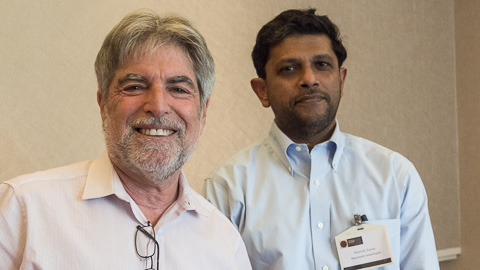New treatments harnessing the immune system can target previously uncurable diseases
Top researchers presented cutting-edge research on immune regulation and the interaction of our immune system and microbiota in the 43rd Scandinavian Society for Immunology meeting on 11 - 13 May 2016.

Key speakers of the event included professor Jeffrey Bluestone from University of California San Francisco and professor Ramnik Xavier from the Broad Institute of MIT and Harvard.
The annual Scandinavian Society for Immunology meeting and summer school took place in Turku between Tuesday 11 and Friday 13 of May. This year’s meeting focused on the far reaching impact of findings in immunology that are proving to be crucial in the treatment of cancer, autoimmune diseases and metabolic diseases.
Professor Jeffrey Bluestone from the University of California San Francisco works with harnessing the immune system’s effects to treat diabetes, lupus or organ transplant rejection.
– We are now doing research on how to grow T cells externally and re-inject them into a patient to treat various diseases in a safe and feasible way. I think in the next five to ten years we will see an enormous acceleration of both research and drug development designed around using the immune system to cure previously uncurable diseases, tells Bluestone.
It is becoming more and more apparent that the immune system is not only involved in a broader spectrum of human diseases than previously thought, but also with the microbiome and the bacteria that we encounter in our everyday lives.
Professor Ramnik Xavier from the Broad Institute of MIT and Harvard University works with innate and adaptive immunity and has recently begun working with type 1 diabetes.
– We found out in collaboration with Finnish researchers that there are differences between the microbiomes of children at higher and lower risks of developing type 1 diabetes, Xavier says.
The research suggests that differences in improved sanitation and standard of living, which impact an individual’s microbiome, may have a part in increasing the risk of developing type 1 diabetes.
– We looked at the microbiomes of Russian Karelian infants in contrast to Finnish infants. In Russian Karelia the prevalence of type 1 diabetes is six times lower in than in Finland, and we believe their gut microbiome may be responsible for this difference.
Co-operation in the field with Finnish scientists has been essential for Xavier and his team.
– A PhD student from Academy of Finland Centre of Excellence has spent a couple of years in Xavier’s lab at MIT and we also currently share a post doc between his and my lab. We gain a lot of knowledge from this type of researcher mobility and exchange of ideas, which is why meetings like SSI are crucial, tells professor Riitta Lahesmaa from University of Turku.
Text: Ellinoora Havaste
Photographs: Ellinoora Havaste and NuVue Therapeutics, Inc. (resized)